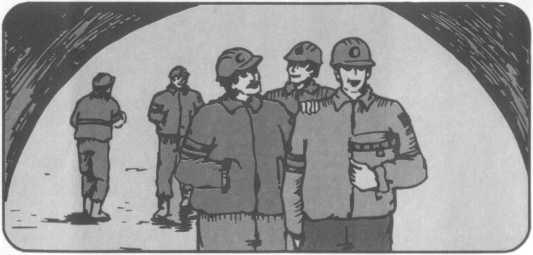BEGINNER
- Tanışma Diyalogları / Conversations
- Zamirler / Pronouns
- Cümle Kurma / Forming a Sentence
- İsimlerde Tekil, Çoğul / Singular, Plural Nouns
- İsimlerde Sayılabilirlik, Sayılamazlık / Countable, Uncountable Nouns
- Article “-a”, “-an”
- İşaret Zamirleri / Demonstratives (this, that)
- Kelimeler / Vocabulary
- Ülkeler / Countries
- Renkler / Colours
- Aile / Family
- Meslekler / Jobs
- Kıyafetler / Names of Clothes
- Yiyecekler / Names of Food and Drinks
- Vücudumuz / Our Body
- Ev Eşyaları / Household Items
- Popüler Kısaltmalar / Popular Abbreviations
- Sık Kullanılan Sıfatlar / Frequently Used Adjectives
- Kelimelerin Olumsuzları / Opposites of Words
- Article “the”
- İyelik Sıfatları / Possessive Adjectives
- İyelik Zamirleri / Possessive Pronouns
- Prepositions/İlgeçler/Edatlar
- There is, There are
- Miktar İfadeleri / Expressions of Quantity
- Sayılar / Numbers
- Saatler / Times
- Günler, Aylar ve Tarih Okuma / Days, Months and Reading the Date
- Sahiplik / Expressing Possession
- Fiil Cümleleri
- Exercise Sentences
ELEMENTARY
INTERMEDIATE
UPPER INTERMEDIATE

The Channel Tunnel
The Channel Tunnel (İngilizce Çocuk Hikayeleri)
Everyday, Charlie Parks and Louis Duvivier picked up their lunch boxes, kissed their wives good-bye and went to work. These two men both worked at the Channel Tunnel. Charlie never saw or spoke to Louis. Charlie worked in Folkestone and Louis worked in Calais! The English Channel separates these two towns. When the tunnel opened, Great Britain was no longer an island!
1. to pick up: to take in your hand.
2. lunch box: a Container to put your picnic lunch in.
3. both: the two together.
4. no longer: no more.
Charlie and Louis started work on the Tunnel in 1988. The men had a difficult job! They operated massive wheels at 100 meters under the sea bed. These wheels had huge teeth that rotated. They cut through 20 metres of the hard chalk rock every day.
Other men put the rock in lorries and took it to the surface.
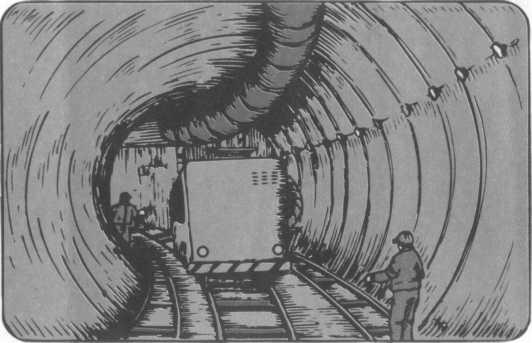
1. massive/huge: very big.
2. wheel: wheels rotate and vehicles or machines move forwards or backwards. (A bicycle has got two wheels and a car four.)
3. sea bed: the bottom of the sea.
4. hard is the opposite of soft.
5. chalk: teachers write on blackboards with chalk.
''Bonjour. Je m'appelle Charlie," said Charlie.
"Why are you learning French, dad?" Charlie's son Roy asked.
"Because, when we meet the French workers in the middle of the tunnel, I want to speak to them in French."
In Calais, Louis was studying English! "How ARE you do?" said Louis.
"No, no, no. How DO you do?" Corinne corrected her father. "Your English is dreadful."
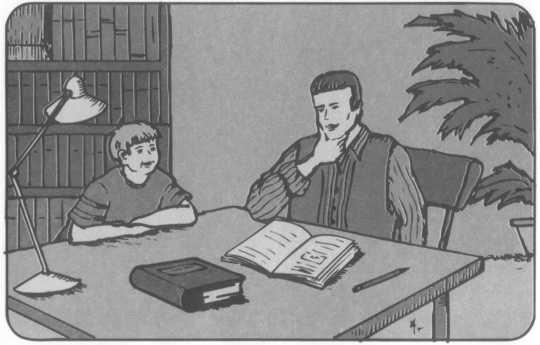
1. to learn is the opposite of to teach.
2. to meet: to see.
3. worker: a person who works.
4. middle: centre.
5. dreadful: terrible.
Roy and Louis's daughter Corinne were very curious about the tunnel. Every evening, when their fathers arrived home from work, they always asked a lot of questions.
"How many tunnels are there?" Roy asked his father.
"There are two tunnels for the trains. They are thirty-one miles long, and 7.6 metres in diameter," Charlie answered. 'There is a third, smaller tunnel in the centre. That is for maintaince and ventilation."

1. curious: ınterested.
2. one mile = 1609 metres.
3. maintaince: to keep a machine in good working order.
4. ventilation: a means of supplying fresh air
"The trains will be very, very modern." Louis told his daughter, "When the cars and lorries arrive at the Channel, they can drive straight on the train."
"But the trains are too small!" said Corinne.
"Some of the tunnel trains are bigger and wider than normal trains'' explained her father.
"The cars will go on double decker trains," continued Louis, "and coaches and caravans will go on single decker trains. The lorries will go on the bigger trains."

1. straight on: directly on.
2. bigger: comparative of big.
3. wider: comparative of wide.
4. doubie decker: a train or bus with two floors.
5. single decker: an ordinary train or bus with only one floor.
One afternoon there was an accident1. Ambulances and police cars raced down the tunnel. Roy and his mummy went too.
"What's happened?" they asked a policeman.
"About twenty minutes ago, part of the wall of the tunnel collapsed'' the policeman answered.
"Have ali the men come out?" asked Mrs Parks worriedly'' "My husband was working in there."
"Unfortunately there are three men trapped inside," continued the policeman.There were a lot of people outside the tunnel. They wanted to know who was hurt.
"Look," said Roy, "the men are coming out."
A group of workers came out carrying a man on a stretcher.
"It isn't daddy on the stretcher'' shouted Roy.
"Are you hurt?" Mrs Parks asked her husband.
"No, no, I'm fine," he said. "It wasn't a serious accident. Some bricks fell on Joe Evan's foot. He'll be fine in a few days."
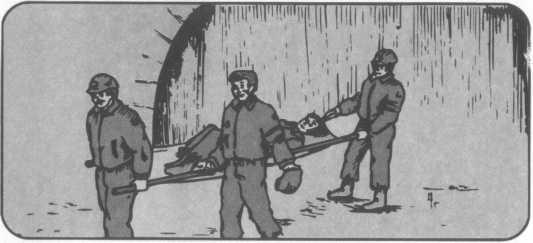
1. hurt: injured.
2. carrying: bringing.
3. stretcher: a mobile bed used in ambulances.
4. bricks: bricks are used for building walls.
5. fell is the past tense of to fail.
Why are they building the tunnel dad?" asked Roy.
"There are ferry boats, hovercrafts, and planes. Will it be cheaper?"
"No, it won't," Charlie answered. "The hovercraft is cheaper than the tunnel, and the ferryboat is probably the cheapest. The plane is more expensive, but you can't put a car or a lorry on the plane."

1. to build: to construct.
2. hovercraft: a type of boat that travels across the sea on a cushion of air.
3. won’t: (future tense) abbreviation of will not.
4. cheapest: (superlative ofcheap) not expensive.
How long will it take the train to go through the tunnel?" asked Roy.
"it will take thirty-five minutes from Folkestone to Calais," Charlie answered.
Roy was bewildered. "I don't understand why they are building the tunnel'' he said. "It only takes twenty- five minutes to cross the Channel by hovercraft. The ferryboat takes about one and a half hours, but it's not as expensive as the tunnel."
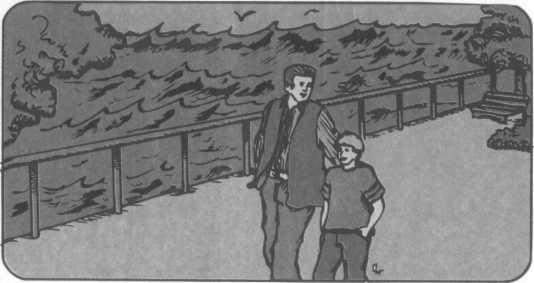
1. How long will it take: how much time is needed.
2. to go through: to go from one side to the other side.
3. Roy was bewildered: Roy didn’t understand, he was confused.
4. one and a half: 1 V2 fi
in the spring and in the summer the tourists will go on the ferryboat and the hovercraft'' explained Charlie. "But in the winter the sea is often very rough. Sometimes there is fog and terrible wind. When the weather is bad, it is difficult for the ferry boats to cross the Channel. It is impossible for the hovercraft! The tunnel will be quicker and safer'
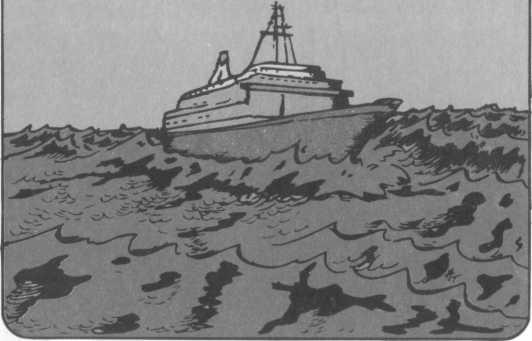
1. spring, summer, autumn and winter are
the four seasons.
2. rough sea: turbulent, agitated sea.
3. fog and wind: bad atmospheric conditions
3. bad is the opposite of good.
4. safer: (comparative ofsafe) more secure.
All the men in the tunnel were very nervous. The massive wheels had two metres to do to complete1 the tunnel! "Let's hope we arrive at the same point" one workman said.
The workers laughed. They knew that the satellite lasers kept both tunnels in a straight line.
The big wheels slowly stopped turning. Charlie looked through the hole and came face to face with Louis!
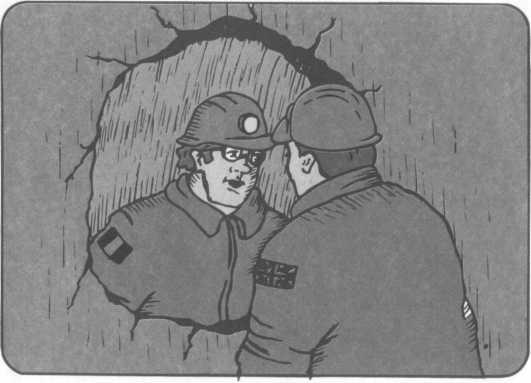
1. to complete: to finish.
2. same point: same place.
3. kept is the past tense of to keep.
4. straight line: direct line.
5. hole: space.
''is the tunnel finished?" asked Charlie's son Roy.
"Yes," said Charlie.
'Today we met the French workmen in the middle of the tunnel. It was a great occasion, but I couldn't remember a single word in French. They gave us a bottle of champagne to celebrate!" "What did you give them?" asked Roy. "We gave them... a cup of tea!"
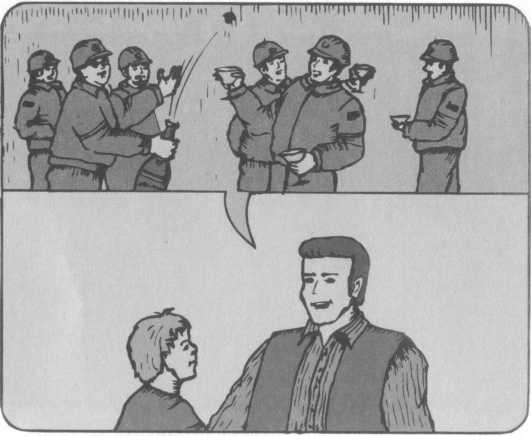
1. met is the past tense of to meet.
2. in the middle: in the centre.
3. great: marvellous.
4. gave is the past tense of to give.
The official opening of the tunnel was in spring 1994. There was a super, up- to-date train ready to go through the tunnel.
People saw Queen Elizabeth and the Duke of Edinburgh get on at the front of the train. They didn't see Charlie Parks and Roy get on at the back of the train! Charlie and Roy had special permission to travel on the train.
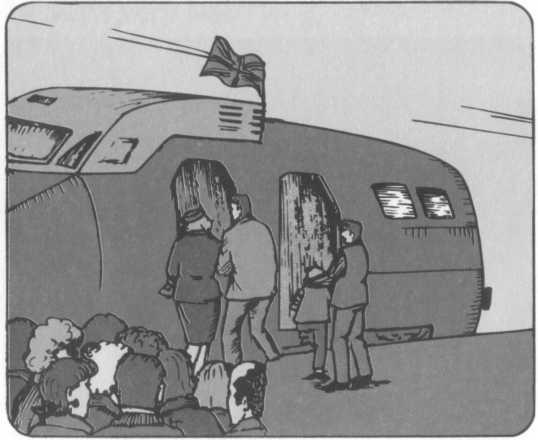
1. up-to-date: very modern.
2. ready: prepared. j-
3. saw is the past tense of to see.
4. permission: justification, authority.
The Queen waved out of the window and the train slowly moved out of the station in London.
Ali the workmen cheered as the train went through the tunnel.
The 'Chunnel' train, as people nicknamed it, slowly stopped in Calais station.
The door opened and the Queen stepped off the train. Queen Elizabeth was the first Monarch to cross the Channel... by land!
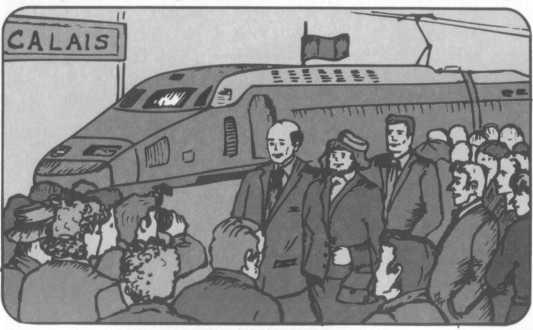
1. to wave: to signal ‘hello’ with the hand.
2. to cheer: to shout happily often using the word HURRAH!
3. nickname: a short name; for example, Joe is a nickname for Joseph.
4. to step off: to leave the train.
